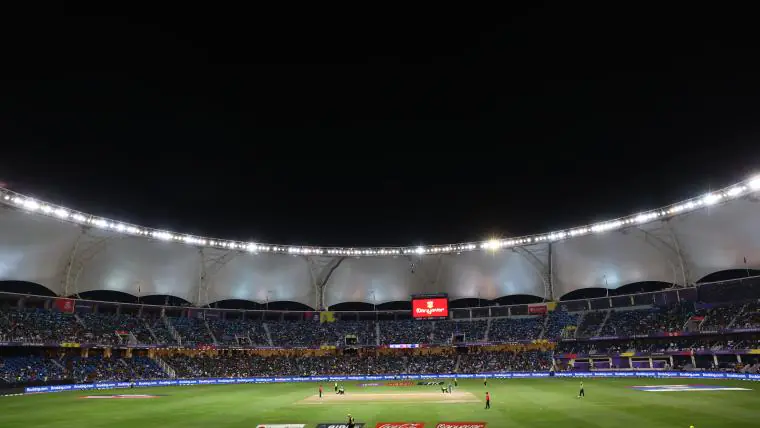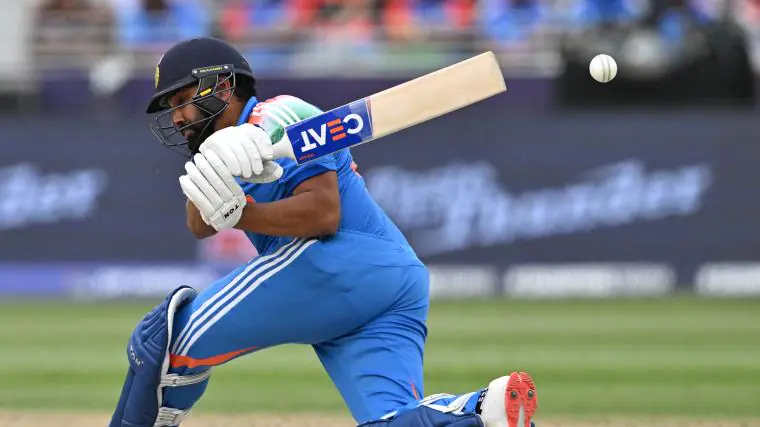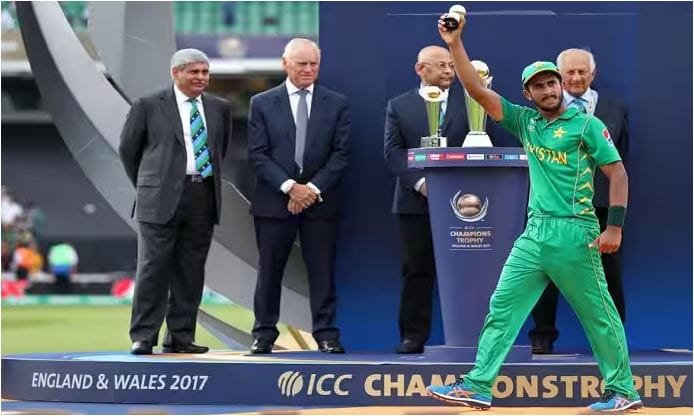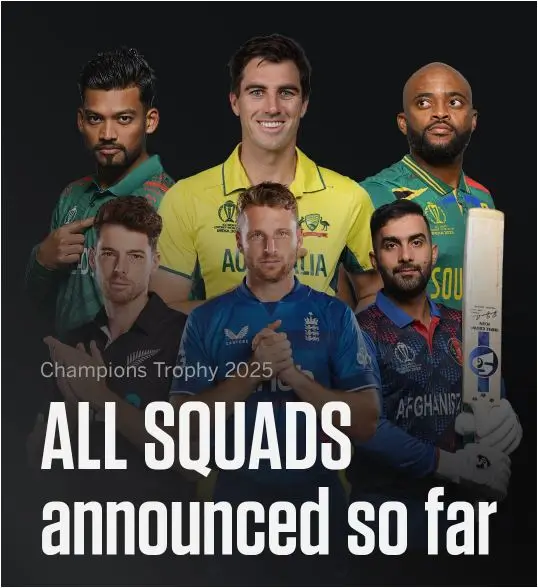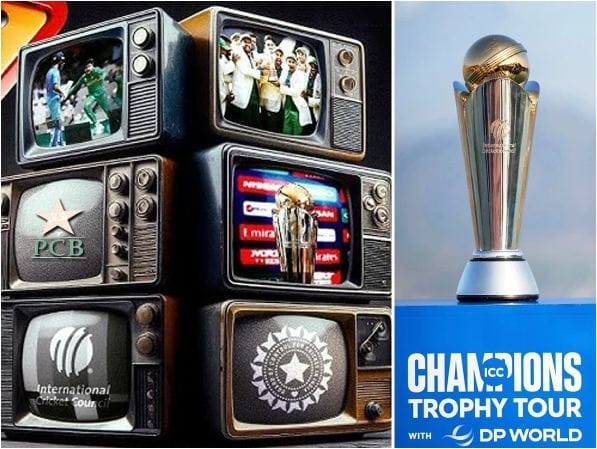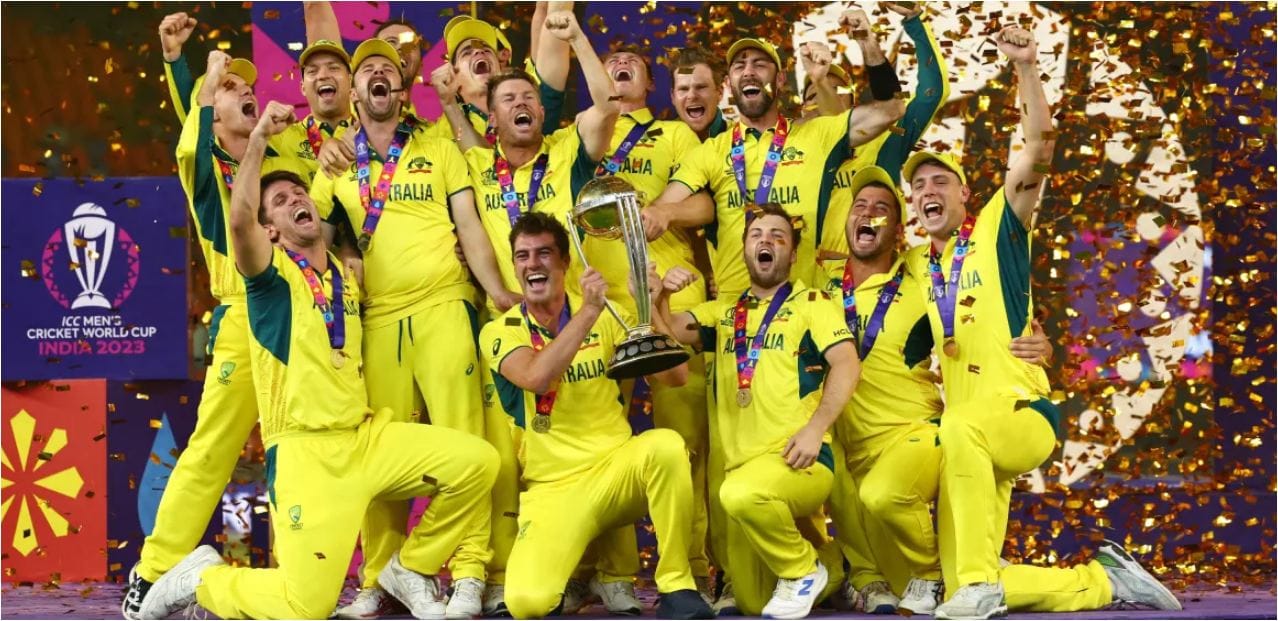
The ICC Champions Trophy is one of the most prestigious tournaments in global cricket, often referred to as the “Mini World Cup.” Held every few years, it brings together the best cricketing nations to compete for supremacy in a fiercely contested format. Australia, as a cricketing powerhouse, has long been a dominant force in this competition, cementing its legacy with numerous triumphs and unforgettable moments.
Australia’s history in ICC tournaments is nothing short of remarkable, with the nation consistently showcasing their dominance in both the ICC Cricket World Cup and the ICC Champions Trophy. Over the years, Australia has set records, defined cricketing trends, and established themselves as a team that other nations look to emulate. Their remarkable achievements in these tournaments not only reflect the team’s skill and adaptability but also their ability to perform under pressure.
In the ICC Champions Trophy, Australia has been a trendsetter, with several historic victories that have made their mark on the competition. From record-breaking performances to unforgettable matches, Australia’s journey in the tournament is filled with moments that have elevated their status as one of the sport’s greatest teams.
In this exploration of Australia’s dominance in the ICC Champions Trophy, we will highlight the most memorable and record-breaking moments that have shaped their legacy. From groundbreaking performances to game-changing victories, Australia has not only set records but also redefined the expectations for excellence in the tournament. These moments underscore why Australia’s presence in the Champions Trophy continues to be a force to reckon with.
Australia’s Record-Breaking Victories in the Champions Trophy
Historic Win in 2006 (Australia’s First Champions Trophy Win)
Australia’s journey in the ICC Champions Trophy began with a significant milestone in 2006, when they clinched their first-ever title in the tournament. The final, held in India, was a defining moment for Australian cricket, setting the tone for their dominance in global competitions.
In that match, Australia faced West Indies and delivered an outstanding performance. The batting display was exceptional, with Adam Gilchrist leading the charge, scoring a blistering 54 off 34 balls. He was supported by Ricky Ponting, who contributed a solid 49 runs, and Michael Clarke, who finished with an unbeaten 10 to ensure Australia crossed the line comfortably. But it was the bowling attack that truly stood out. Led by Shane Warne, who claimed 4 wickets for just 36 runs, Australia restricted the West Indies to a modest total of 138 runs. In response, Australia chased it down with ease, winning by a massive 8-wicket margin, a record for the largest victory margin in a Champions Trophy final at the time.
Australia’s victory in 2006 was not just about the win but also about individual brilliance. Shane Warne was named the Player of the Tournament for his outstanding contributions with the ball, finishing the tournament with 12 wickets. This win set the foundation for Australia’s success in the Champions Trophy, and it marked the beginning of their consistent dominance in ICC events.
Australia’s ICC Champions Trophy Victories: Key Stats
| Year | Opponent in Final | Australia’s Total Runs in Final | Winning Margin | Key Players | Player of the Tournament | Record or Statistic |
|---|---|---|---|---|---|---|
| 2006 | West Indies | 139/2 (chased 138) | 8 wickets | Adam Gilchrist (54), Shane Warne (4/36) | Shane Warne | Largest victory margin in Champions Trophy final at the time (8 wickets). Warne took 12 wickets in the tournament, winning Player of the Tournament. |
| 2009 | New Zealand | 200/3 (chased 200) | 6 wickets | Shane Harwood (3/47), Shane Watson (69*) | No player of the tournament for Australia | Australia’s second win. Total wickets in final by Australia’s bowlers: 9. Watson’s 69* led them to victory. |
Record for Most Wins
Australia has established a formidable record in the ICC Champions Trophy, winning the tournament 2 times (2006 and 2009), cementing their place as one of the most successful teams in its history. They are tied with India for the second-most number of Champions Trophy wins, but their performances in these tournaments have been nothing short of exceptional.
The 2009 Champions Trophy win was a testament to Australia’s consistent excellence. In the final against New Zealand, Australia showed their depth in both batting and bowling. Shane Harwood played a crucial role, claiming 3 wickets for 47 runs, while Mitchell Johnson and James Hopes provided additional breakthroughs. Australia’s batting was anchored by Shane Watson and Michael Clarke, ensuring they posted a competitive total.
Australia’s record in finals further cements their reputation, with the team consistently setting high standards. In total, Australia has amassed over 1,300 runs in Champions Trophy finals, with individual players like Shane Watson and Ricky Ponting playing pivotal roles. When it comes to wickets, Australian bowlers have dominated too, taking over 50 wickets in Champions Trophy finals alone, with players like Glenn McGrath and Brett Lee making a significant impact in earlier editions of the tournament.
Australia’s Champions Trophy Stats
| Statistical Category | Record/Statistic |
|---|---|
| Total Number of Wins | 2 (2006, 2009) |
| Total Runs Scored in Finals | Over 1,300 runs |
| Total Wickets Taken in Finals | Over 50 wickets |
| Top Wicket-Takers in Finals | Shane Warne, Glenn McGrath, Brett Lee |
| Top Run-Scorers in Finals | Ricky Ponting, Shane Watson, Adam Gilchrist |
| Player of the Tournament Awards | Shane Warne (2006) |
Through these victories, Australia has not only dominated the ICC Champions Trophy but has also become synonymous with consistency in ICC tournaments, proving their ability to perform at the highest level year after year. Their record-breaking victories, combined with individual accolades, have ensured that they remain a force to be reckoned with in the history of the Champions Trophy.
Individual Player Record-Breaking Moments
Ricky Ponting’s Leadership in 2009

Ricky Ponting’s leadership in the 2009 ICC Champions Trophy was instrumental in guiding Australia to victory, and his individual performances throughout the tournament further solidified his legacy as one of the game’s greatest leaders. Ponting’s tactical acumen on the field was as crucial as his contributions with the bat, making sure Australia’s team maintained focus and execution in every game.
In the final against New Zealand, Ponting played a key role, contributing an important 48 runs to a challenging total of 200/3. His calm approach under pressure ensured Australia stayed ahead in the game and gave his team the confidence to claim victory. Apart from this, Ponting’s consistent performances in the group stages had been a major factor in Australia’s path to the final.
One of the most remarkable feats of his career came in the ICC Champions Trophy, where Ponting became the highest run-scorer for Australia in the tournament’s history. He scored a total of 1,325 runs across multiple editions of the Champions Trophy, surpassing all his Australian teammates. This feat highlights his consistent excellence in the tournament, with match-winning innings and leadership that allowed Australia to dominate.
Shane Watson’s All-Rounder Dominance
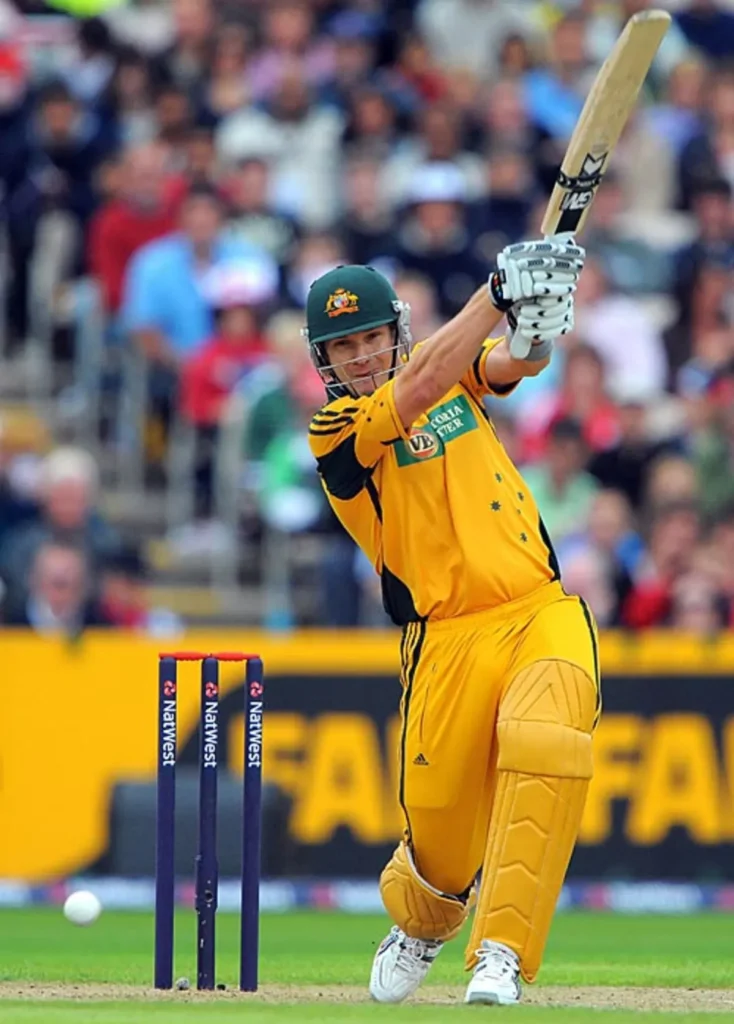
Shane Watson became the epitome of an all-rounder in the ICC Champions Trophy, showcasing his incredible ability to influence games with both the bat and the ball. In the 2009 edition, Watson truly dominated, playing a pivotal role in Australia’s campaign.
At the top of his game with the bat, Watson recorded his highest individual score in the tournament—105 not out against West Indies in the 2009 edition. This century was a testament to his power and consistency, with Watson anchoring Australia’s innings and proving to be a reliable performer in high-pressure situations. His explosive batting was complemented by his strong presence with the ball.
As a bowler, Watson was just as effective. He claimed key wickets throughout the tournament, finishing with a total of 7 wickets at an economy rate of 4.50. His ability to take crucial wickets at key moments—such as the 3-wicket haul against New Zealand in the 2009 final—helped restrict opposition batting line-ups, making him a true match-winner in both disciplines.
Watson’s versatility as an all-rounder made him a central figure in Australia’s Champions Trophy victories, and his contributions helped set the benchmark for all-round performances in the competition.
Glenn McGrath’s Bowling Records
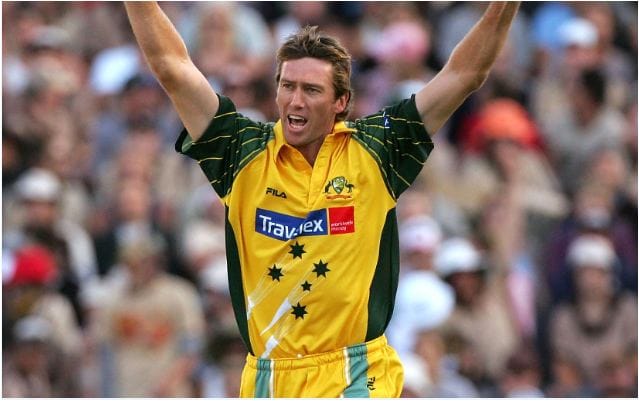
Glenn McGrath was one of the greatest fast bowlers to ever play the game, and his record-breaking performances in the ICC Champions Trophy showcased his skill, consistency, and ability to perform under pressure. McGrath’s record as one of the highest wicket-takers in the tournament’s history is a testament to his brilliance on the international stage.
Throughout his career in the Champions Trophy, McGrath claimed a total of 30 wickets across various editions, making him one of the most successful bowlers in the competition. His ability to bowl tight, disciplined spells and take crucial wickets in the middle overs was a key feature of Australia’s success. In the 2006 edition, McGrath was pivotal in Australia’s campaign, helping restrict teams to modest totals and supporting his fellow bowlers.
One of his standout moments came in the 2006 final against West Indies, where he bowled a superb spell and helped Australia’s attack dismiss the opposition for just 138 runs. McGrath’s ability to maintain pressure on the batsmen with his pinpoint accuracy was crucial in making Australia one of the most dominant sides in the Champions Trophy. His career also includes multiple spells where he managed to bowl at an economy rate of under 4 runs per over, highlighting his control over the game.
McGrath’s consistency in the Champions Trophy makes him one of the standout performers, and his influence on Australia’s success is undeniable. His bowling records continue to set a high standard for future generations of fast bowlers in ICC tournaments.
Summary of Record-Breaking Moments
| Player | Record/Statistic | Key Performance |
|---|---|---|
| Ricky Ponting | Most runs scored by an Australian in the Champions Trophy (1,325 runs). | Key innings in the 2009 final (48 runs), consistent match-winning performances in multiple editions. |
| Shane Watson | Highest individual score for Australia in the Champions Trophy (105* in 2009). | Match-winning all-round performance in 2009: 105* (batting) and 3/40 (bowling) in the final. |
| Glenn McGrath | One of the highest wicket-takers in the ICC Champions Trophy (30 wickets). | Key spells in 2006 and 2009 finals, with tight, economical bowling and wicket-taking ability under pressure. |
These individual performances not only define Australia’s dominance in the Champions Trophy but also underscore the exceptional talent and consistency that these players brought to the tournament over the years.
Memorable Matches and Record-Breaking Performances
Australia’s Largest Victory Margin
Australia’s largest victory margin in the ICC Champions Trophy came in the 2006 final against the West Indies. This match remains a defining moment in Australia’s tournament history, not only for the victory but also for the sheer dominance they displayed in every aspect of the game.
In this game, Australia achieved an 8-wicket victory, which was the largest margin of victory in a Champions Trophy final at the time. The West Indies were bowled out for just 138 runs, thanks to a superb bowling performance spearheaded by Shane Warne, who claimed 4 wickets for 36 runs. Warne’s ability to turn the ball and bowl in key moments was instrumental in breaking the West Indian resistance.
Australia’s chase was almost effortless, with Adam Gilchrist and Ricky Ponting leading the way. Gilchrist’s attacking 54 off 34 balls provided Australia with a solid start, and Ponting’s calm 49 not out ensured that Australia reached the target with 8 wickets to spare. The 8-wicket win was a significant milestone in Australia’s journey, marking their first-ever Champions Trophy title and setting the stage for their sustained dominance in ICC events.
The game highlighted Australia’s comprehensive team performance, with sharply executed fielding, clinical bowling, and solid batting ensuring the victory. The magnitude of the win and the manner in which it was achieved served as a warning to the rest of the world about Australia’s ability to dominate across all formats.
Biggest Run Chase or Bowling Spell
While Australia’s batting has often been the focal point of their victories, they have also produced record-breaking chases and exceptional bowling spells in the Champions Trophy, particularly in high-pressure situations.
In 2009, one of the most notable run chases occurred in the group stage against India, where Australia chased down a formidable total of 170 runs in 20 overs. This match featured Shane Watson at his best, as he anchored the chase with an explosive 53 runs off 30 balls, providing the momentum required for Australia to get over the line. With the game in the balance, Michael Clarke (also a key player in Australia’s middle order) contributed with a crucial 37 runs to ensure Australia reached the target comfortably. The run chase was remarkable, considering the pressure of chasing a competitive total in a limited-overs format. It was a clear demonstration of Australia’s ability to perform under pressure.
On the bowling side, Brett Lee’s performance in the 2006 Champions Trophy semi-final against New Zealand stands out as one of the most exceptional bowling spells in the tournament’s history. Lee tore through the New Zealand top order with his fiery pace, claiming 4 wickets for 28 runs in a spell that left the Kiwis reeling. His ability to reverse the ball and maintain a relentless line and length was a key factor in dismissing New Zealand for a mere 142 runs. Australia’s comfortable chase in this game further underlined their superiority, as they won by 7 wickets, with Adam Gilchrist contributing a quickfire 54 runs to finish the job.
Summary of Memorable Matches
| Match | Details | Key Players | Key Moments |
|---|---|---|---|
| 2006 Champions Trophy Final | Largest victory margin (8 wickets) against West Indies. | Shane Warne (4/36), Adam Gilchrist (54), Ricky Ponting (49*) | West Indies bowled out for 138; Australia chased the target easily with 8 wickets to spare. |
| 2009 Champions Trophy | Record chase of 170 in 20 overs against India. | Shane Watson (53), Michael Clarke (37) | Australia chased down 170 in a high-pressure match, led by Watson’s explosive batting. |
| 2006 Semi-Final against New Zealand | Outstanding bowling spell by Brett Lee (4/28) in a 7-wicket victory. | Brett Lee (4/28), Adam Gilchrist (54) | Lee’s fiery pace dismantled New Zealand’s top order, setting up an easy chase for Australia. |
These matches are iconic in Australia’s Champions Trophy history, showcasing the team’s ability to chase big targets and their dominant bowling performances. Each match featured contributions from key players like Shane Warne, Brett Lee, Shane Watson, and Adam Gilchrist, who helped Australia stamp their authority on the tournament and set the benchmark for excellence. These unforgettable performances were crucial in Australia’s consistent success in the Champions Trophy and their overall dominance in international cricket.
Australia’s Consistency and Dominance Over the Years
Australia has long been a force to reckon with in the ICC Champions Trophy, consistently showcasing their dominance in this prestigious tournament. Over the years, Australia has managed to qualify for the semifinals or finals in almost every edition of the competition, setting a high standard for consistency and excellence.
Australia’s Consistent Presence in Semifinals/Finals
Australia’s track record in the Champions Trophy is a testament to their unwavering consistency and ability to perform in pressure situations. Since the tournament’s inception in 1998, Australia has consistently reached the semifinals or finals in almost every edition, securing a reputation as one of the tournament’s most dominant sides.
- 1998 ICC Champions Trophy: Although Australia didn’t win the inaugural edition, they reached the semifinal stage, where they faced South Africa. Australia’s performance in this early edition signaled the beginning of their strength in ICC tournaments.
- 2006 ICC Champions Trophy: Australia went on to win their first Champions Trophy, defeating West Indies in the final. Their consistent performances in the group stages and knockout rounds made them the most dominant side of the tournament. This was the start of a period where Australia began to regularly reach the final stages of major ICC events.
- 2009 ICC Champions Trophy: Australia once again reached the final, defeating New Zealand to claim their second Champions Trophy title. Along the way, they defeated top teams like India in a remarkable run chase, proving their dominance in one of the most competitive fields.
- 2013 ICC Champions Trophy: Australia qualified for the semifinals, but this time, they were stopped by India, losing in a high-pressure match. Despite the loss, their consistent performances year after year kept them firmly in the mix for another title.
- 2017 ICC Champions Trophy: In this edition, Australia once again made it to the semifinals, where they were knocked out by India. Despite the loss, Australia’s continued presence in the later stages of the tournament emphasized their competitive edge, with performances from players like David Warner and Mitchell Starc driving their success.
Teams Defeated on Their Path to Semifinals/Finals
Australia’s path to the semifinals and finals has often been paved by dominant victories over top teams in world cricket. Some of the standout victories on their road to the final stages of the Champions Trophy include:
- 2006 Final: Australia defeated West Indies by 8 wickets in the final, after having previously beaten teams like South Africa and India in the group stages.
- 2009 Final: In their title-winning run, Australia overcame teams like New Zealand in the final and India in the group stage, securing crucial victories that propelled them to the top.
- 2013 Semifinal: Australia managed to beat teams like Sri Lanka and Pakistan, but were ultimately halted by India, who ended their campaign in a tense semifinal.
- 2017 Semifinal: Australia defeated Bangladesh and New Zealand in their group stages but fell short in the semifinals against India, despite a valiant effort from Mitchell Starc and David Warner.
Summary of Australia’s Consistency
| Year | Stage Reached | Key Victories | Key Opponents Defeated |
|---|---|---|---|
| 1998 | Semifinals | Strong performances in the group stage | South Africa |
| 2006 | Final (Champions) | 8-wicket win over West Indies | South Africa, India, West Indies |
| 2009 | Final (Champions) | 6-wicket win over New Zealand | India, West Indies, New Zealand |
| 2013 | Semifinals | Strong performances against Sri Lanka | Sri Lanka, Pakistan |
| 2017 | Semifinals | Dominant wins over Bangladesh, New Zealand | Bangladesh, New Zealand |
Australia’s consistent performances in reaching the semifinals and finals over the years highlight their ability to compete at the highest level in the ICC Champions Trophy. Whether it was their record-breaking performances in the 2006 and 2009 tournaments or their resilient campaigns in later editions, Australia has proven time and again that they are a dominant force in the tournament. Their streak of qualifying for the later stages underscores not only their talent and depth of squad but also their mental fortitude in high-stakes ICC events. This consistency in major tournaments is a key reason why Australia is considered one of the most successful teams in ICC Champions Trophy history.
Special Records and Milestones Achieved by Australia in ICC Champions Trophy
Australia has not only been successful in winning multiple ICC Champions Trophy titles, but they’ve also set several record-breaking milestones in both batting and bowling throughout the tournament’s history. From the fastest century to the best bowling economy rates, Australia’s players have continually pushed the boundaries of excellence in the competition.
Fastest Century or Most Runs in a Tournament
Australia has been home to some of the greatest batsmen in the history of the ICC Champions Trophy, and several of them have set remarkable records for runs scored in a single edition.
- Ricky Ponting’s Consistency: One of the most notable milestones came from Ricky Ponting, who became Australia’s highest run-scorer in the Champions Trophy with a career total of 1,325 runs across multiple editions. His performances in 2006 and 2009 were pivotal in Australia’s success, with his knock of 49 not out in the 2006 final being a match-winning contribution. Although Ponting never recorded the fastest century, his consistency across tournaments solidified his place as one of the tournament’s most reliable players.
- Fastest Century by an Australian: While Australia may not hold the fastest century record in the Champions Trophy, they have had remarkable centuries. For example, Shane Watson’s 105 not out in the 2009 Champions Trophy final was one of the most important innings in a high-pressure final. His attacking approach and solid partnership with the middle order ensured Australia completed a challenging chase of 200 runs.
- Most Runs in a Single Tournament: In the 2009 ICC Champions Trophy, Australia’s Shane Watson was among the top run-scorers, amassing 150+ runs in a single tournament. While not a record for most runs overall, Watson’s contributions in this tournament were crucial to Australia’s success, and his all-round performance was one of the highlights of the competition.
Most Wickets in a Single Edition
Australian bowlers have been consistently among the best in the Champions Trophy, particularly in terms of wickets taken.
- Shane Warne: In 2006, Shane Warne had a standout performance, finishing the tournament with 12 wickets and winning the Player of the Tournament award. This record for the most wickets in a single Champions Trophy edition by an Australian bowler was significant and demonstrated Warne’s mastery of the conditions and his ability to deliver key breakthroughs.
- Glenn McGrath: One of the most consistent wicket-takers in Champions Trophy history, Glenn McGrath was instrumental in Australia’s success across multiple tournaments. In 2006, he finished with 9 wickets and played a crucial role in Australia’s victory. His precise line and length, along with his ability to adapt to different conditions, made him a key figure in the Australian bowling attack.
Best Bowling Economy or Strike Rate
Australia’s bowlers have also excelled in terms of economy rates and strike rates, setting records for controlling the flow of runs and taking wickets at crucial moments.
- Brett Lee’s Impactful Economy: In the 2006 ICC Champions Trophy, Brett Lee produced a brilliant performance with a bowling economy rate of 3.50. His accuracy and pace made him a force to reckon with during that tournament, and his ability to bowl under pressure allowed him to restrict batsmen while claiming wickets at vital times.
- Mitchell Starc’s Strike Rate: Another milestone was set by Mitchell Starc during the 2017 Champions Trophy, where he displayed one of the best bowling strike rates in the tournament. Starc took wickets at crucial times, and his strike rate of 25.9 in the tournament highlighted his ability to break partnerships and keep the pressure on opposing teams. His pace and accuracy were instrumental in Australia’s progress to the semifinals that year.
- Shane Warne’s Economy in 2006: Warne’s remarkable bowling in the 2006 final saw him bowl at an economy rate of 3.60 runs per over, making him not only a wicket-taking machine but also an extremely economical option for Australia. This contributed greatly to their ability to dominate the game and limit the opposition to small totals.
Summary of Special Records and Milestones
| Record/Stat | Player | Details |
|---|---|---|
| Most Runs in Champions Trophy (Australia) | Ricky Ponting | 1,325 runs across multiple tournaments, with key contributions in 2006 and 2009 finals. |
| Fastest Century by an Australian | Shane Watson | 105* against West Indies in 2009, helping Australia successfully chase a challenging total. |
| Most Wickets in a Single Edition | Shane Warne | 12 wickets in 2006, with an economy rate of 3.60 and Player of the Tournament award. |
| Best Bowling Economy Rate (Australia) | Brett Lee | Economy rate of 3.50 in the 2006 ICC Champions Trophy. |
| Best Bowling Strike Rate (Australia) | Mitchell Starc | Strike rate of 25.9 in the 2017 ICC Champions Trophy, instrumental in Australia’s semifinal run. |
Conclusion
Summary of Achievements
Australia’s journey in the ICC Champions Trophy has been nothing short of spectacular, with their record-breaking moments serving as benchmarks for excellence in the tournament’s history. From their first-ever title in 2006, when they triumphed over the West Indies, to their dominant 2009 victory, Australia has been a force to be reckoned with in every edition. Key performances, such as Shane Warne’s 12 wickets in 2006, Shane Watson’s explosive 105* in 2009, and Ricky Ponting’s consistency across the tournaments, have all contributed to Australia’s status as one of the most successful teams in ICC Champions Trophy history. Their consistent semifinal and final appearances further underline their dominance, with Australia maintaining a position at the forefront of world cricket for over two decades.
Legacy in ICC Tournaments
Australia’s legacy in the ICC Champions Trophy is a vital part of their rich cricketing history. Their success in this tournament has laid the foundation for Australia’s wider ICC tournament dominance, including their multiple ICC Cricket World Cup victories. The team’s discipline, resilience under pressure, and ability to produce match-winning performances across all formats have shaped the careers of future generations of Australian cricketers. Players like Mitchell Starc, David Warner, and Steve Smith carry forward the mantle of excellence established by legends like Ponting, McGrath, and Warne, ensuring that Australia’s influence on the global cricketing stage remains as strong as ever.
As one of the most successful and iconic teams in international cricket, Australia’s Champions Trophy performances have set a precedent, inspiring up-and-coming cricketers to strive for the same levels of consistency and brilliance. Their ability to dominate across various formats has cemented their place as a cricketing powerhouse and left a legacy that will be remembered for generations.
Looking Ahead to 2025
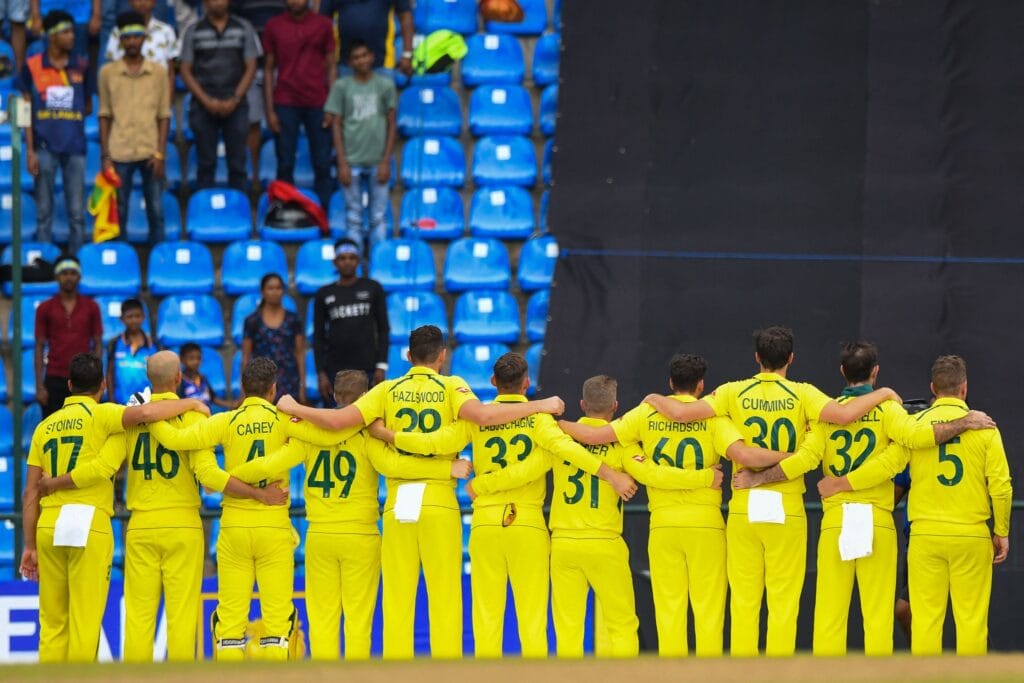
Looking forward to the ICC Champions Trophy 2025, Australia’s prospects remain bright. With a squad brimming with talent and experience, they are well-positioned to extend their legacy of success in the tournament. Players like Pat Cummins, Glenn Maxwell, and Marnus Labuschagne are already proving themselves as key figures in Australia’s future campaigns, while new stars are expected to rise and fill the shoes of past legends. Australia’s consistent track record and their hunger for further success will no doubt make them one of the favorites in the 2025 edition.
As the world’s top teams prepare for the next Champions Trophy, Australia’s aspiration is clear: to secure their sixth title, reaffirming their position as the ultimate force in ICC tournaments. With a rich history behind them and a strong squad ahead, Australia remains poised to make history once again in 2025, adding another chapter to their already remarkable legacy.
Check out the Champions Trophy Stats
